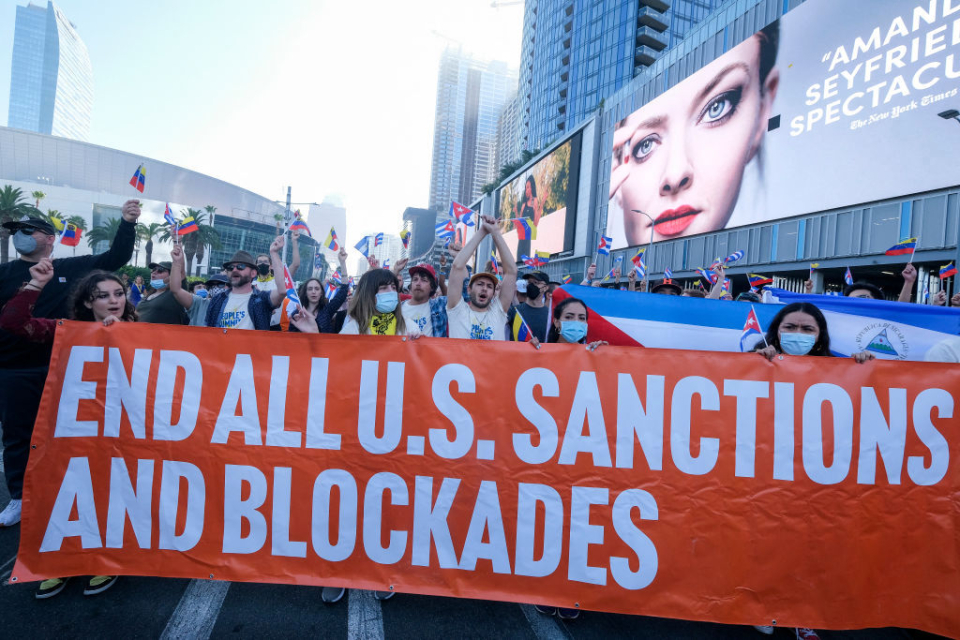Sanctions are a form of collective punishment. Their costs are overwhelmingly borne by innocent people rather than governments. And they are just another form of war, not an alternative to it. The US’s many sanctions across the world need to end.
he US government is sanctioning so many countries right now, it’s hard to keep track of them all.
There are the countries you probably know about, like Russia, Syria, Iran, and Venezuela. There are the ones you hear less about, like Nicaragua, Yemen, Afghanistan, and Myanmar. And then there are the official enemies that Washington has sanctioned for decades, like Cuba and North Korea.
These sanctions are presented to the public as a nondestructive, even humane alternative to military action. But a new report from the Center for Economic and Policy Research (CEPR) lays out the brutal and damaging reality of sanctions regimes and their human costs. Synthesizing the findings of dozens of studies and examining the sanctions’ impact on three targeted countries in particular, the CEPR study makes clear what critics of the policy have long stressed: that sanctions are a form of collective punishment, whose costs are overwhelmingly borne by the innocent people ruled by the often undemocratic governments US officials seek to punish and which is in practice not so much an alternative to war as an alternative form of it.
The report, titled “The Human Consequences of Economic Sanctions” and drawing on thirty-two studies of sanctions and their effects, concludes that “economic sanctions generate significant levels of distress in target economies,” and that “the populations most often harmed, and in some cases killed, by sanctions are also voiceless in decisions about their adoption.”
The author of those words, Francisco R. Rodríguez, is far from a bomb-throwing iconoclast: an economist who has done stints at the United Nations and Bank of America Merrill Lynch, Rodríguez also served as the chief economist for the National Assembly of Venezuela, one of the countries examined in the report, and in 2018, advised an opposition presidential candidate who challenged current Venezuelan president Nicolás Maduro.Sanctions are a form of collective punishment, whose costs are overwhelmingly borne by the innocent people ruled by the often undemocratic governments US officials seek to punish.
Surveying the research on sanctions, the report finds that thirty of the thirty-two papers examined conclude there are “significant negative long-run effects on indicators of human and economic development.” This body of research has found that sanctions lead to significant rises in everything from poverty, mortality, income inequality, and childhood HIV infection rates, to instances of international terrorism and the likelihood of government repression and human rights violations — even a decline in democracy.
When sanctions regimes target both a country’s trade and financial transactions, the studies show, GDP drops anywhere between 0.9 and 4.2 percent, while per capita GDP — the total economic output of each individual person in a country, on average — is slashed by as much as 26 percent. To put that in perspective, during the 2008 recession, the United States suffered a 4.3 percent drop in GDP.
Only one study disputes these findings: a 2021 study by Caracas-based think tank Anova, which claimed that US sanctions on Venezuela saw the importation of essential goods improve and living standards rise. But that study was based on a coding error and dubious modeling choices, the CEPR paper argues, including the decision to leave out categories of imports like cereals, oils, and sugars, which together made up four-fifths of Venezuela’s food imports in the year it was slapped with sanctions.
The reality of US sanctions on Venezuela — the “maximum pressure” campaign started by the Donald Trump administration in 2017 as a way to foment regime change in the country — is far bleaker.
The country suffered “the largest economic collapse outside of wartime since 1950,” Rodríguez writes, with US sanctions preceding a collapse in oil revenues, in a country where oil made up 95 percent of all exports in the last year before sanctions and which is heavily reliant on imports for food and medicine. (CEPR had previously found that US sanctions led to forty thousand more Venezuelan deaths from 2017 to 2018).
While a number of neighboring countries suffered similarly from a global fall in oil prices in 2016, unencumbered by sanctions, they eventually recovered. Venezuela, meanwhile, continued to suffer a drastic collapse in oil production that had only one other comparison, according to the paper: Yemen, which at the time was having its oil fields bombed into oblivion by the US-backed Saudi war on the country.
“The collapse in Venezuela’s oil production is of a dimension that we only see when armies blow up oil fields,” the study concludes.
It’s a similar state of affairs in Iran. Over the decades, the paper shows, the ups and downs of its per capita GDP and exports map closely onto the placement of Western sanctions following the 1979 Iranian revolution and in 2011 and 2018, as well as a brief recovery after the Iran deal was signed in 2015 and sanctions were lifted. Studies reaffirm what critics of the sanctions have said for years: far from targeting the elite, sanctions have pushed ordinary Iranians into poverty and led to chronic medicinal shortages.
While a lack of data and multiple disruptive events, including the decade-long Soviet war in the country, makes doing this same evaluation trickier when it comes to Afghanistan, the paper observes a similar phenomenon in the ups and downs of the country’s own child mortality rate. The 76 percent fall in real per capita income Afghanistan experienced between 1986 and 2001 is “in line with some of the largest economic collapses observed in modern world history,” Rodríguez writes. While the Taliban hasn’t published official statistics since taking power in the country in 2021, US seizure of its federal reserves has helped trigger a full-blown humanitarian catastrophe in the country that rivals the two-decades-long US occupation for the horror it’s inflicting on ordinary Afghans.While less than 4 percent of the world’s countries were sanctioned in the early 1960s, 27 percent of them are now targets of sanctions regimes.
All of this is important to keep in mind at a time when the use of sanctions has exploded. As the paper points out, while less than 4 percent of the world’s countries were sanctioned in the early 1960s, 27 percent of them are now targets of sanctions regimes, representing nearly a third of world GDP. The Biden administration has made expansive use of this weapon according to the paper, imposing more sanctions per year than even Trump, who had himself far outdone the Barack Obama administration in his zest for using the weapon.
“It is hard to think of other policy interventions that continue to be pursued amid so much evidence of their adverse and often deadly effects on vulnerable populations,” the paper concludes. Even as sanctions have decimated the people of these countries, those sanctions have objectively been a miserable failure when it comes to their nominal goals of collapsing governments or inducing policy changes from them.
It’s high time we talk about the overuse of this weapon and the misery and resentment it fosters around the world, a weapon that US officials continue to cavalierly wield because its human costs and impotence have effectively been hidden from the US public. Here’s hoping the CEPR report helps spark that conversation.
Source: Jacobin

















